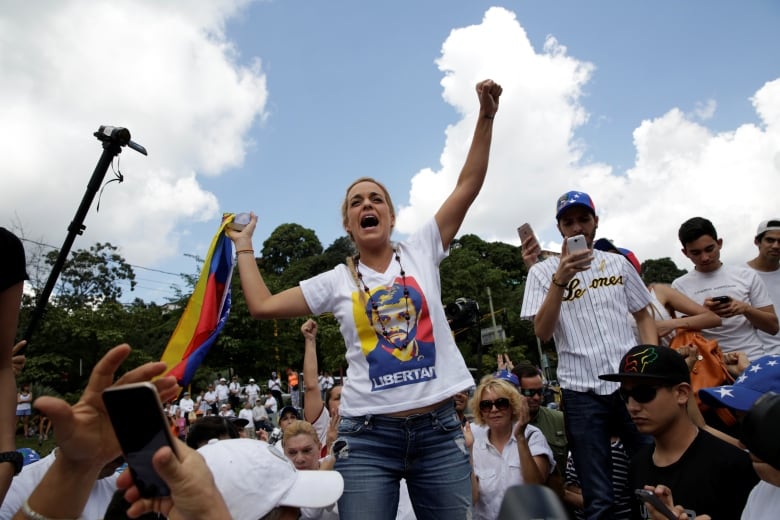Venezuela's political rivals agree to hold talks amid escalating tensions
Negotiations set to begin Sunday, but analysts caution that a breakthrough seems unlikely

Venezuela's government and the opposition will start talks this weekend in a bid to head off an escalating political standoff over the possible removal of Nicolas Maduro, the nation's deeply unpopular president.
But analysts caution that a breakthrough for the country, which is in the midst of a severe economic meltdown, seems unlikely.
- Venezuelans take to the streets, demanding referendum
- Venezuela's economic, political collapse forces Canada to choose sides
In the past, they say, the socialist Maduro government has used dialogue with its adversaries to buy time and manoeuvre its way out of crises without adopting democratic reforms.
"They seem to be using the same strategy this time around. Thus, it is hard to take the government's desire for dialogue at face value," said David Smilde, a senior fellow at the Washington Office on Latin America. "But it is always positive when you can get opposing sides to meet face-to-face."
The talks are scheduled to start Sunday on Margarita Island in the Caribbean. They will be mediated by the Vatican, three former heads of state and an intergovernmental regional organization called UNASUR.
"At last we are installing a dialogue between the opposition and the legitimate government," Maduro said Monday, after meeting in Rome with Pope Francis, an Argentine, who urged the Venezuelan leader to seek a peaceful solution.
'Let pressure out of the system'
The most recent crisis was brought on by the opposition's effort to remove Maduro from office by way of a recall referendum. His six-year-term is scheduled to end in 2019.
Due to critical shortages of food and medicine, and the world's highest inflation rate, many Venezuelans are going hungry. Polls show that about 80 per cent want Maduro to go immediately.
Timing is critical. If the recall had been held this year, it would have opened the door for the opposition to return to power for the first time since the late Hugo Chavez launched Venezuela's socialist revolution in 1998. (If Maduro is voted out in 2017, his vice-president will instead finish the term.)
"That's what the recall referendum was all about: To let pressure out of the system. Now there is no way for that pressure to get out of the system," said Charles Shapiro, a former U.S. ambassador to Venezuela.

Last week, the National Electoral Council, which is dominated by Maduro allies, claimed that the opposition had engaged in fraud while collecting the signatures needed to trigger the recall. It didn't offer proof to back up those claims.
It was one of many recent decisions that have concentrated power in Maduro's hands. During his three years in office, his government has jailed opposition leaders, stripped the opposition-controlled Congress of most of its functions, postponed gubernatorial elections, and cracked down on the independent media. The opposition had clung to the hope that the recall would provide a way out.
Its suspension marks "a very significant step toward outright authoritarianism in Venezuela," said Harold Trinkunas, a Venezuela expert at Stanford University.
"Basically they are saying they are not willing to give up power through constitutional means."
Caracas-based political analyst Margarita Lopez Maya said that with the decision, Maduro has decided to forego the façade of democratic rule and "move toward an outright dictatorship."
Breaking into the National Assembly
Tensions are rising. On Sunday, the flashpoint was the National Assembly, where opposition lawmakers debated whether to undertake what would be largely symbolic impeachment proceedings. But the special session was interrupted by a pro-government mob that forced its way into the building.
The invaders chanted slogans and clashed with opposition legislators and their aides, leaving at least four people injured.
Now, opposition leaders are calling for a "popular revolt" via nationwide protests, starting Wednesday. "The people have the right to rebel," said opposition lawmaker Julio Borges.
The last time anti-government protests convulsed in Venezuela was in 2014, resulting in a fierce crackdown that led to more than 40 deaths. The blocking of the recall "opens the door to wild-card situations, for unpredictable and possibly violent outcomes in Venezuela," Trinkunas said.
The 2014 protests were controlled by government security forces that are even more powerful today.
The armed forces control food distribution while active-duty or former officers head about half of the government ministries. The top brass is viewed as fiercely loyal to the president.
Still, it's unclear how rank-and-file troops, who share many of the hardships of average Venezuelans, will react if called to fire upon protesters this time around, Lopez Maya said.
The government is counting on this weekend's talks to suck the air out of the protest movement. What's more, the diverse coalition of opposition parties is divided over leadership, tactics and strategy.

In fact, several of its most prominent leaders had no idea talks with the Maduro administration were in the works and only learned about them on television.
One of them, Mitzy Ledezma, said negotiations should only go forward once the government agrees to free political prisoners like her husband, Caracas Mayor Antonio Ledezma, currently under house arrest.
- 'Worse than in a war': Venezuela's deepening crisis
- Thousands of Venezuelans enter Colombia for food, medicine
Trinkunas said the government seems unlikely to bend on this or other key issues. For example, reversing itself on the recall referendum could expose government officials to legal charges of corruption, drug trafficking and human rights abuses should a new regime take power.
"It is hard to see why they would take the risk of losing the impunity they currently enjoy by engaging in meaningful dialogue," Trinkunas said.


